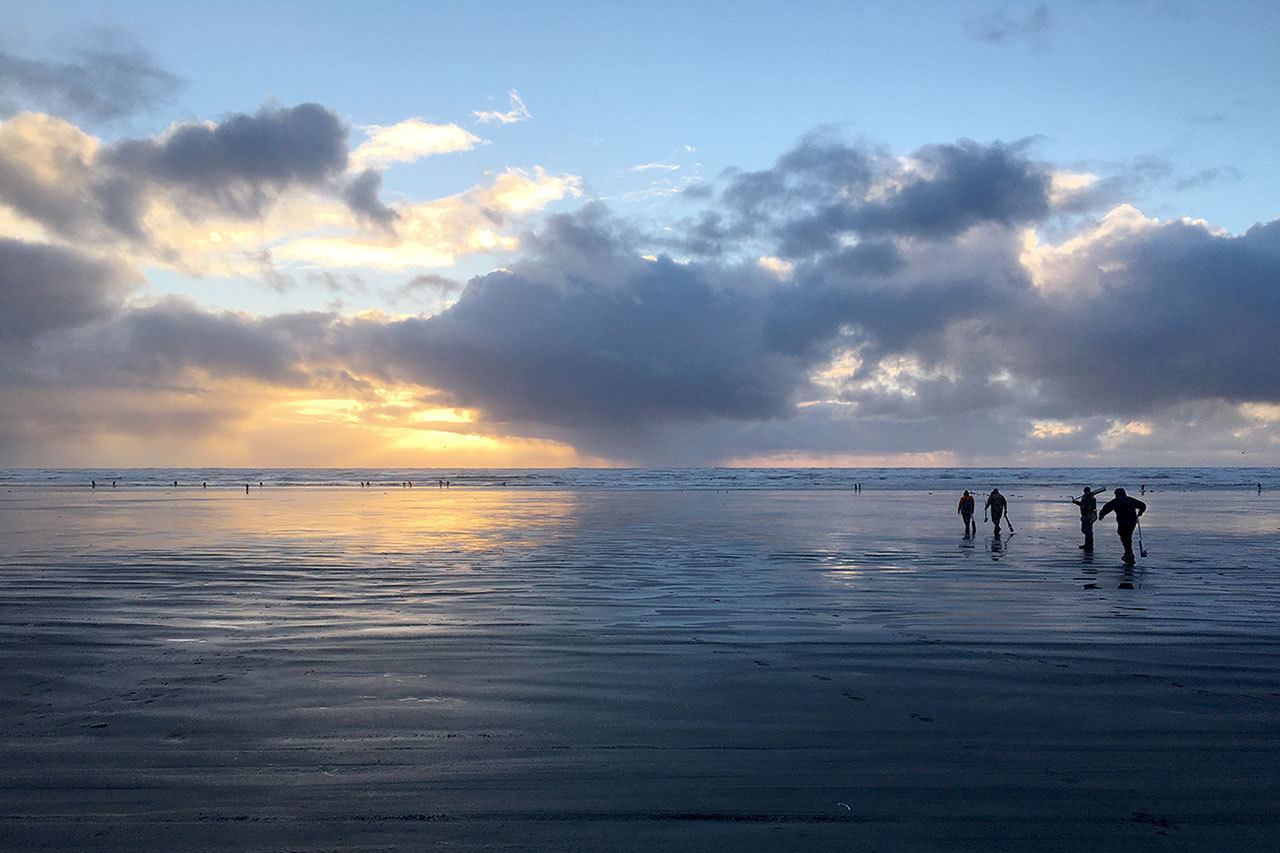Razor clam diggers can count on evening digs starting Feb. 23 and state shellfish managers announced Thursday a schedule of proposed digs through April.
The Washington Department of Fish and Wildlife approved the opening at three ocean beaches starting next week after marine toxin tests confirmed the clams on those beaches are safe to eat.
The upcoming dig is approved on the following beaches, dates and evening low tides:
Feb. 23, Thursday, 4:42 p.m.; 0.3 feet; Twin Harbors
Feb. 24, Friday, 5:21 p.m.; -0.1 feet; Copalis, Mocrocks, Twin Harbors
Feb. 25, Saturday, 5:58 p.m.; -0.3 feet; Copalis, Mocrocks, Twin Harbors
Feb. 26, Sunday, 6:34 p.m.; -0.4 feet; Copalis, Mocrocks, Twin Harbors
Feb. 27, Monday, 7:11 p.m.; 0.3 feet; Twin Harbors
Feb. 28, Tuesday, 7:48 p.m.; 0.0 feet; Twin Harbors
State shellfish managers recommend that diggers hit the beach an hour or two before low tide.
Under state law, diggers at open beaches can take 15 razor clams per day and are required to keep the first 15 they dig. Each digger’s clams must be kept in a separate container.
WDFW also announced a list of proposed digs in March and April, subject to the results of additional marine toxin tests. Shellfish managers will announce a final decision on those openings about a week before each dig is set to begin.
Dan Ayres, coastal shellfish manager for WDFW, noted that the current schedule does not include proposed digs this spring for Twin Harbors or Long Beach.
“We’re waiting to see how the next few rounds of marine toxin tests go before we set a schedule for those beaches,” Ayres said.
Toxin levels on Washington’s southern beaches – Twin Harbors and Long Beach – have been declining. Twin Harbors opened earlier this month when levels of domoic acid met public health standards. A natural toxin produced by certain types of algae, domoic acid can be harmful or even fatal if consumed in sufficient quantities.
If toxin levels at Long Beach continue to drop, the beach could open in March for digging, Ayres said.
Razor clam diggers also should be aware that WDFW plans to alternate digging between Copalis and Mocrocks during March and April. Those two northern beaches will not be open on the same days in the coming months.
“We wanted to maximize the number of days that diggers would have out on the beaches,” Ayres said. “We hope that diggers will pay close attention to the schedule and stay off whichever beach is closed for the day.”
Copalis beach includes Ocean Shores, Oyhut, Ocean City and Copalis areas while Mocrocks includes Iron Springs, Roosevelt Beach, Seabrook, Pacific Beach and Moclips. Maps of the beaches can be found on WDFW’s razor clam webpage at http://wdfw.wa.gov/fishing/shellfish/razorclams/current.html.
Tentative razor clam digs in March and April:
March 9, Thursday, 4:28 p.m.; -0.1 feet; Mocrocks
March 10, Friday, 5:13 p.m.; -0.3 feet; Copalis
March 11, Saturday, 5:54 p.m.; -0.3 feet; Mocrocks, Kalaloch
March 12, Sunday, 7:31 p.m.; -0.1 feet; Copalis, Kalaloch
March 24, Friday, 5:01 p.m.; 0.5 feet; Mocrocks
March 25, Saturday, 5:44 p.m.; 0.2 feet; Copalis
March 26, Sunday, 6:24 p.m.; 0.0 feet; Mocrocks
Seasonal switch to morning tides
March 30, Thursday, 8:58 a.m.; -0.6 feet; Mocrocks
March 31, Friday, 9:47 a.m.; -0.6 feet; Copalis, Kalaloch
April 1, Saturday, 10:40 a.m., -0.5 feet; Mocrocks, Kalaloch
April 2, Sunday, 11:39 a.m.; -0.1 feet; Copalis
April 13, Thursday, 8:43 a.m.; 0.0 feet; Copalis
April 14, Friday, 9:18 a.m.; 0.1 feet; Mocrocks
April 15, Saturday, 9:55 a.m.; 0.3 feet; Copalis
April 16, Sunday, 10:36 a.m.; 0.5 feet; Mocrocks
April 27, Thursday, 7:55 a.m.; -1.5 feet; Mocrocks
April 28, Friday, 8:42 a.m.; -1.8 feet; Copalis
April 29, Saturday; 9:32 a.m.; -1.7 feet; Mocrocks, Kalaloch
April 30, Sunday, 10:24 a.m.; -1.3 feet; Copalis, Kalaloch


